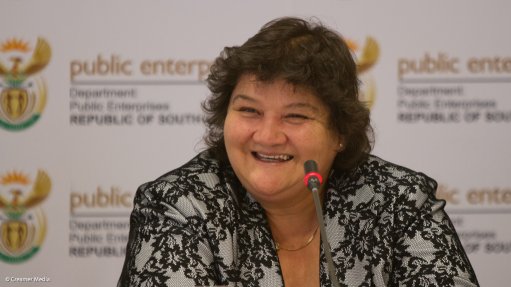
Public Enterprises Minister Lynne Brown
Photo by: Duane Daws
Public Enterprises Minister Lynne Brown said on Wednesday she remained opposed to privatisation of State-owned enterprises (SOEs) and believed Eskom was too vulnerable to contemplate the sale of a stake in any one of its three core capabilities.
“The ruling party does not support privatisation,” Brown told Parliament’s portfolio committee in response to a question about the prospect of privatising SAA, before reminding MPs that the troubled national carrier no longer fell under her ministry but under National Treasury.
“I really hold the view that for basic services we should not privatise,” she added.
“Eskom is a provider of a basic service — electricity. However, even if we were to think about breaking up the company — it is divided into transmission, distribution and generation — all three of them are inter-dependent on each other.The one can’t exist without the other. I think at this stage Eskom is just too vulnerable to even contemplate that.”
But she left the door open for a future role for private entities in the electricity supply industry, saying this may happen following further discussion with the department of energy.
“However, we also need to understand what is the energy mix, what is the end state of energy, and that is a discussion we are having with the department of energy in order to determine Eskom’s role within it because if we understand that, then bring back the ISMO (Independent System and Market Operator) Bill in some respect.”
Brown added that she was in favour of private partnerships with parastatals and singled out Denel as a success in this regard.
“So look the discussion has to do with the fact that we have got to determine the strategic role the SOE plays and Denel is in my portfolio and I have not stopped them from going into strategic partnerships with business. I think it is an important element.
“In fact Denel’s order book (for the next ten years) is way over the R30-billion that it had a year ago, we leave now to go and secure quite huge deals in the UK.”
Denel went through a highly successful turnaround in the early 2000s and has been mooted as a model for bringing private capital into ailing state-owned enterprises. It remains fully state-owned but government has allowed private sector participation in some of divisions, including aviation and land systems.